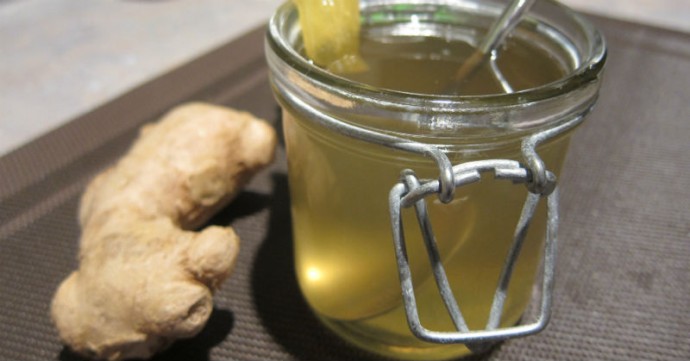
Ginger (Zingiber officinale Roscoe) is a
flowering plant that originated in China and is also related to turmeric
and cardamom. The rhizome (root) is the part that is used for spice,
as a preservative, a tea and for medicinal purposes. Ginger is one of
the healthiest spices known. It is packed full of nutrients and
bioactive compounds that offer tremendous benefits to your body.
So why should you add ginger to your diet? Take a look at some of the amazing health benefits:Antibiotic- The effects of ginger and antibiotics on Staphylococcus aureus and S. pyreus infections shows that ginger extract may be superior. (1)
Cancer-Several studies have shown the ability of ginger to defeat numerous types of cancer cells, including breast, colon, pancreatic, prostate and skin cancer. (3, 4, 5, 6, 7, 8, 9, 10)
Diabetes Prevention– Studies show that diabetes can be prevented and treated along with lowering blood sugar levels. (11)
Inflammation– Inflammation goes hand in hand with many chronic conditions. Ginger inhibits nitrous oxide production and inflammatory cytokines. It is very effective in dealing with arthritis and other general inflammatory illnesses. (13)
Menstrual Pain– A double blind study showed powdered ginger capsules to be as effective in treating menstrual pain as non-steroidal anti inflammatories and placebos. (14)
Nausea– Gingers ability to relieve nausea has long been known. It is useful for morning sickness, sea sickness and nausea of all sorts. (15, 16)
Periodontal– Ginger has wonderful antibacterial effects on periodontal disease. (17)
Toxicity- Ginger helps prevent the toxic effects of numerous substances including MSG, pesticides, and cancer drugs. (18, 19)
Possible Interactions:
Ginger does have a few negative side effects. Allergic reactions usually result in a rash, although some individuals experience heartburn, bloating, gas, burping or nausea. These symptoms are more common when consuming ginger in a powdered form.According to Drugs.com ginger interacts with prescription drugs such as heart medication, diabetes medication, warfarin, aspirin, NSAIDs and blood thinners.
Please discuss any concerns with your health care practitioner.
Make Your Own Ginger Honey Syrup
IngredientsGinger root
Honey
Peel a large piece of ginger, grate it and place in pan.
Pour in enough honey to cover the ginger.
Simmer 10-15 minutes, or until ginger is mushy, allow to cool slightly. (You can strain the ginger out of the honey if you like. I leave mine with the honey).
Pour into jar, label and date.
Refrigerate and it will last for several weeks.
Enjoy this in smoothies, milk, tea, on ice cream, pancakes, hot oatmeal, or on a fruit salad. You can also add 2-3 Tablespoons to a cup of hot water for tea.
References:
http://umm.edu/health/medical/altmed/herb/ginger
- http://www.ncbi.nlm.nih.gov/pubmed/17010224
- http://www.ncbi.nlm.nih.gov/pubmed/12588480
- http://www.ncbi.nlm.nih.gov/pubmed/18972844
- http://www.ncbi.nlm.nih.gov/pubmed/19481070
- http://www.jnutbio.com/article/S0955-2863%2807%2900133-7/abstract
- http://onlinelibrary.wiley.com/doi/10.1002/ijc.23923/abstract
- http://online.liebertpub.com/doi/abs/10.1089/jmf.2010.1191
- http://www.ncbi.nlm.nih.gov/pubmed/17066513
- http://www.medicalnewstoday.com/articles/41747.php
- http://www.ncbi.nlm.nih.gov/pubmed/18030663
- http://www.ncbi.nlm.nih.gov/pubmed/17010224
- http://www.ncbi.nlm.nih.gov/pmc/articles/PMC3136331/?tool=pubmed
- http://www.sciencedirect.com/science/article/pii/S0278691509000775
- http://www.ncbi.nlm.nih.gov/pubmed/19216660
- http://www.ncbi.nlm.nih.gov/pubmed/3277342
- http://www.ncbi.nlm.nih.gov/pubmed/12233808
- http://www.ncbi.nlm.nih.gov/pubmed/18814211
- http://www.ncbi.nlm.nih.gov/pubmed/19579948
- http://www.ncbi.nlm.nih.gov/pubmed/19371770
http://baconhound.com/wp-content/uploads/2013/12/IMG_4642.jpg

